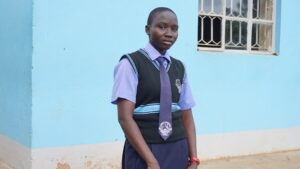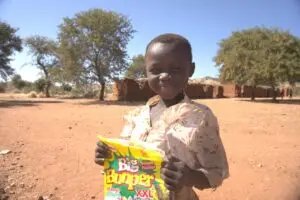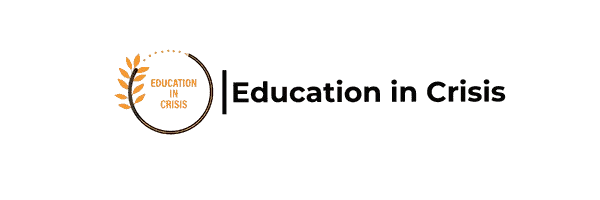Protection and Inclusion
Every child deserves a chance. Be the reason they thrive today.
 DONATE NOW AND SUPPORT OUR MISSION.
DONATE NOW AND SUPPORT OUR MISSION.
Protection and Inclusion
Education in Crisis (EiC) has established itself as a trusted national and regional actor in advancing child protection, gender equality, and social inclusion across fragile and conflict-affected settings in East Africa. Rooted in EiC’s founding principle that no child should be left behind because of crisis or circumstance, our programming integrates protection and inclusion as central pillars of quality education and community resilience.
- Child Protection in Emergencies (CPiE)
EiC’s child protection work is grounded in community-based approaches that identify, prevent, and respond to violence, abuse, neglect, and exploitation of children. Through community protection committees, school safeguarding clubs, and psychosocial support programs, EiC builds safe learning environments for displaced and host-community children. The organization has developed robust mechanisms for referral, case management, and survivor support, working closely with local authorities, UN agencies, and protection clusters to ensure accountability to affected populations.
- Gender Equality and Women’s Empowerment
EiC integrates gender equality and women’s leadership into all education and protection interventions. Our programs train and mentor women and girls to participate meaningfully in community decision-making and leadership roles, thereby tackling the root causes of gender-based violence and inequality. We promote the transformative leadership of women and youth through capacity-building workshops, mentorship initiatives, and advocacy platforms that amplify their voices in policy and peacebuilding processes.
- Disability and Inclusive Education
EiC champions disability inclusion by ensuring that children with disabilities access learning opportunities and protection services without discrimination. We collaborate with local organizations of persons with disabilities (OPDs) to design and adapt inclusive education materials, strengthen teachers’ capacity for inclusive pedagogy, and establish functional referral systems that link learners to health, psychosocial, and livelihood services. Accessibility and participation of persons with disabilities are systematically mainstreamed across all EiC programs.
- Policy Advocacy and Systems Strengthening
EiC works at both grassroots and policy levels to influence frameworks that safeguard children and promote inclusion. Through research, evidence generation, and strategic partnerships, EiC contributes to national and regional dialogues on child protection, safeguarding, and education in emergencies, aligning with the Sustainable Development Goals (SDGs 4, 5, 10, and 16) and the African Union’s Agenda 2063.
- Proven Experience
Across Sudan, South Sudan, Kenya, Tanzania, and Uganda, EiC has implemented protection and inclusion initiatives reaching over 100,000 children and community members through awareness campaigns, school-based interventions, and gender-transformative programming. Our technical teams combine local expertise with global standards such as the Minimum Standards for Child Protection in Humanitarian Action (CPMS) and Inter-Agency Standing Committee (IASC) Guidelines on Inclusion of Persons with Disabilities.

At Education in Crisis (EiC), protection and inclusion are at the heart of our programming. We believe that every child, woman, man, girl, boy and young person regardless of gender, ability, displacement status, or background has the right to live, learn, and thrive in safety and dignity.
EiC’s programming integrates protection mainstreaming and inclusive practices across all sectors education, livelihoods, health, and humanitarian response — ensuring that interventions do no harm, uphold human rights, and create equitable opportunities for all. Our approach prioritizes the safety, participation, and empowerment of the most at-risk groups, including survivors of gender-based violence (GBV), children with disabilities, internally displaced persons, and marginalized communities affected by conflict, poverty and disaster.
We are committed to strengthening community-based protection mechanisms, advancing gender equality and women’s leadership, and supporting the transformative participation of young people in decision-making processes. EiC works in close collaboration with community leaders, government institutions, and humanitarian partners to build resilient and inclusive systems that protect individuals from abuse, neglect, exploitation, and exclusion.
Through continuous training, awareness, and accountability to affected populations, EiC ensures that its programs are safe, inclusive, and responsive — upholding the highest standards of safeguarding and protection. In every emergency and recovery context, EiC stands as an advocate for justice, equality, and the fundamental right to protection and participation for all.

Join Us in Reaching 10,000 Scholars by 2029
Sponsor a child’s education today and leave your legacy on EiC’s Foundational Wall of Champions. Together, we can transform lives—one scholar at a time.
We cannot do it alone. Together, stronger we can.
Education and learning are not just about books and classrooms; it’s about offering hope, resilience, and the promise of a better future.
Despite the small support provided by EiC and other humanitarian actors, the education needs of children in emergencies far exceeds the assistance that is currently provided.
Greater funding is urgently needed to support the world’s most vulnerable children left behind with lifesaving education.
Let’s stand together to support these children and safeguard their right to education.
Their futures depend on it.
